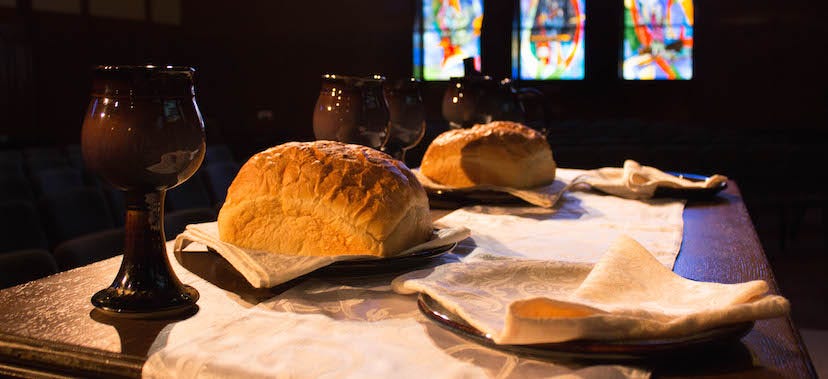Eating (and Experiencing) God
“One’s position on the Supper is an accurate index of one’s understanding of the Christian faith as a whole.” The Lord's Supper by Robert Letham (23)
Previous to embracing Reformed doctrine, I lived a majority of my Christian life with a Zwinglian understanding of the sacrament of the Lord’s Supper: communion is a memorial – a remembrance – of Christ’s death and resurrection, and little more.
In my small town Methodist church, our congregation’s practice of this same perspective manifested itself in communion once a quarter, open to everyone regardless of evaluation, and with no fencing the table to anyone as to eating and drinking judgment on oneself. Children of all ages were as readily permitted as adults, and I – as a teenager just come to faith – was given the opportunity multiple times by my well-meaning pastor to not only serve the bread and the cup (in the form of wafers and juice) to the congregants, but also to share anecdotes (which I made up on the spot) of God’s grace and his forgiveness of sin.
Being on staff with a parachurch organization for twelve years did not elevate my (low) view of the sacrament of communion. While I did my best to attend church on Sunday mornings (mostly as part of non-denominational fellowships), there was little doubt my primary ministry was more as part of the organization than of the church; as a result of these blurred ecclesiological lines, I recall a few misuses of communion in the context of ministry – our summer camp staff orientation, or a closing Sunday morning of a conference – none of which I thought twice about, as I had studied and experienced so little of what I now understand to be a more orthodox view of the sacrament.
Deconstructing my past appreciation (or lack thereof) of this means of grace is helpful in recognizing my need now to build a more sound (and meaningful) theology of communion. In the past, I combined the memorial mentality of my youth with my leadership role’s need for team-building and camaraderie; now I recognize that true team-building and camaraderie come not from observing a memorial together, but by being united with and ministered to by Christ on his terms, not mine. Letham writes:
“This (communion) is a sacrament of the church, the body of Christ. It is decisively not to be understood as an individual, private experience…It is corporate first, and individual only within that clearly understood and defined context” (Letham, 42).
But unity is not the only outcome I gain from the Eucharist; a more accurate perspective of God comes as well. As Letham points out:
“Since Christ has gone up to the right hand of God, he cannot, according to his humanity, be physically present here. As a consequence, in the Lord’s Supper, Christ is not brought down to us, but we are lifted up to him” (Letham, 35).
Partaking in communion – preferably on a weekly basis – is a good and constant reminder of the vast ontological difference between God and myself. It’s also a way of acknowledging the difference, both publicly and (hopefully) privately in worship.
Finally, in addition to unity and perspective, I gain greater appreciation for the requisite qualifications of those serving and partaking in communion. Again, Letham rightly stresses the importance that the Word accompanies the sacrament, and that it be through a “minister of the Word properly ordained” (Letham, 50). He also clarifies “definite qualifications for taking the Lord’s Supper” – faith, repentance, and self-examination – as illustrated historically in the forms of baptism, public profession of faith, and active (and orthodox) church membership (Letham, 56).
In sum (and returning to Letham’s opening quote), one’s position on the Supper is indeed an accurate index of one’s understanding of the Christian faith as a whole. I’ve learned much from my past, but have more still to learn about this means of grace from Christ.




